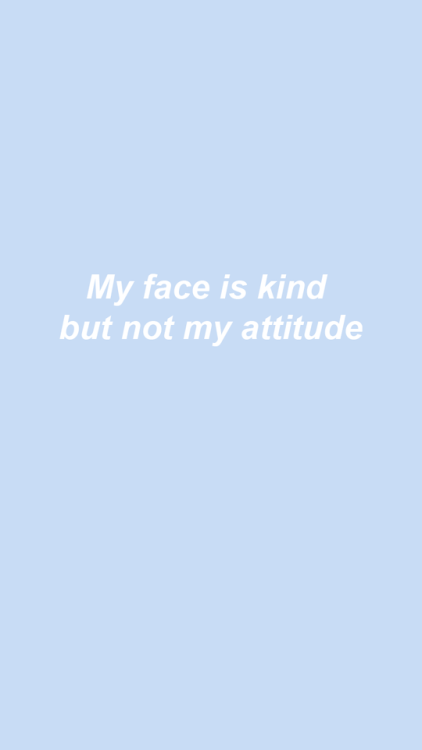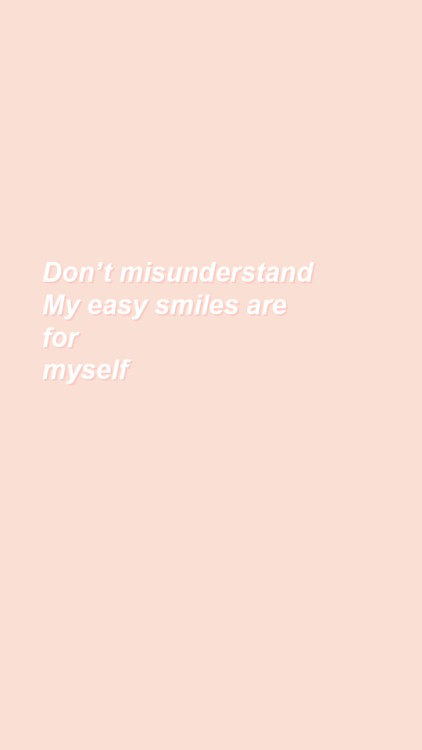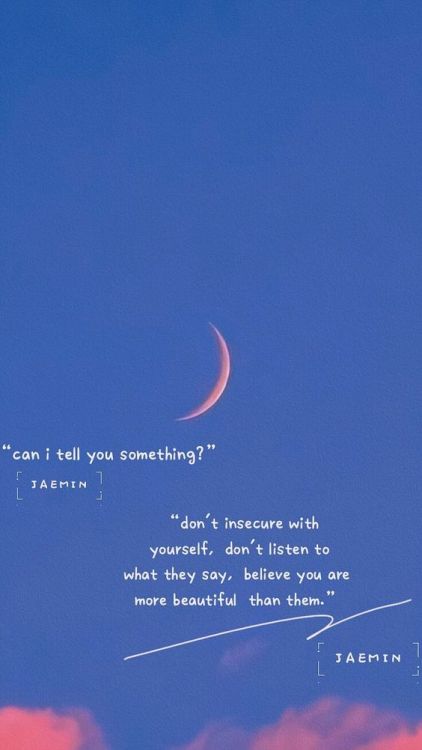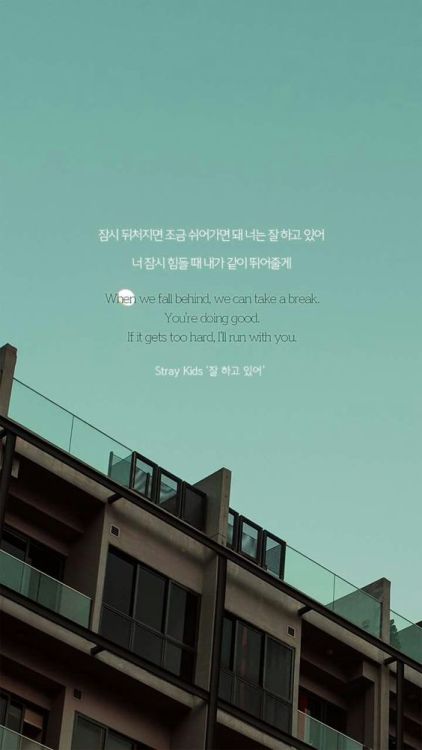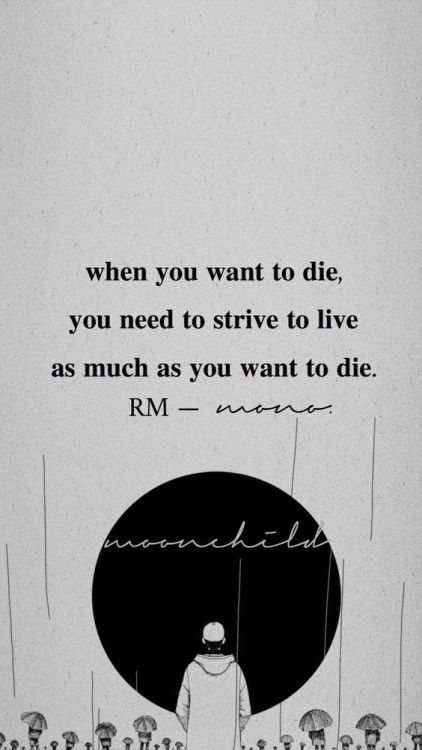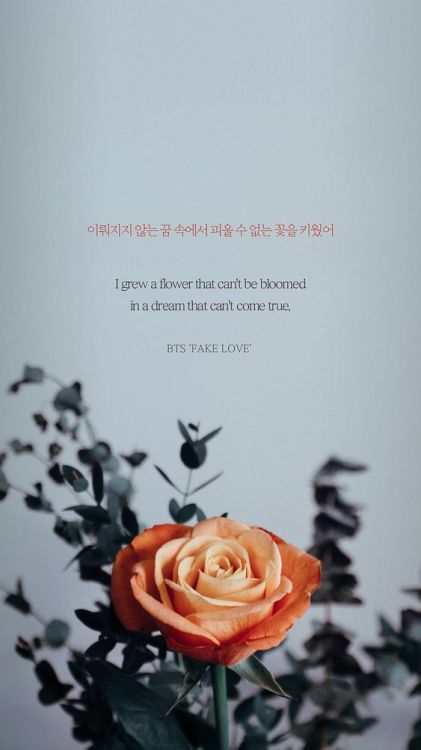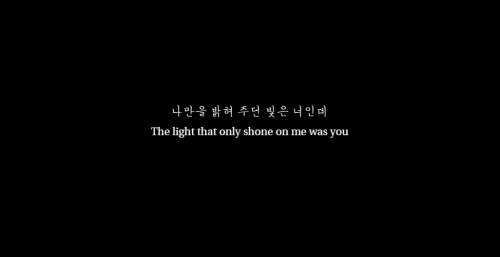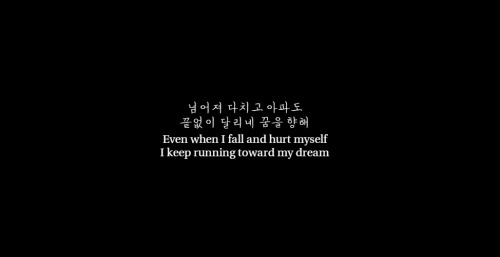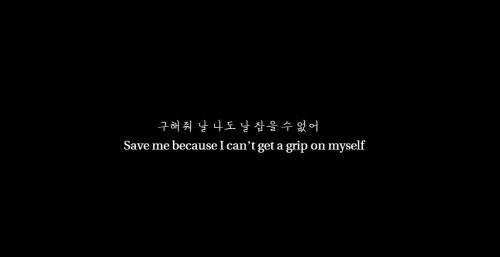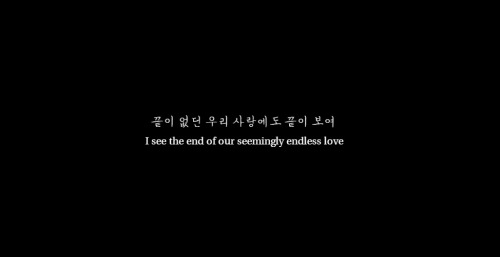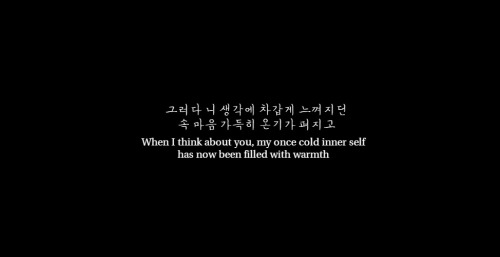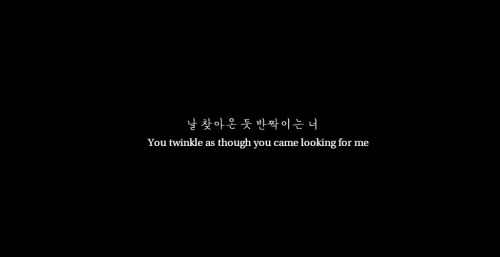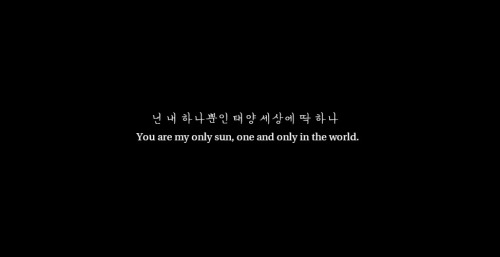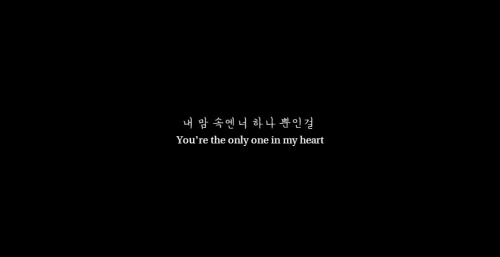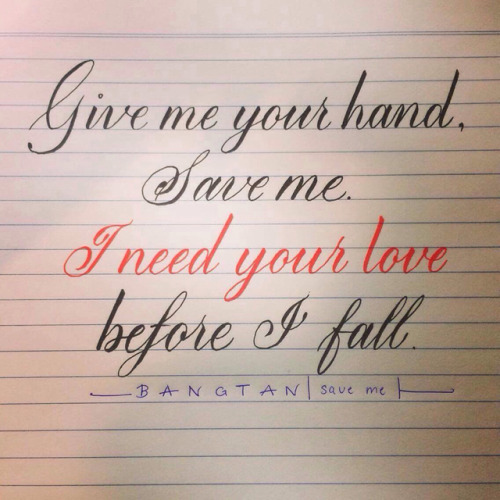#kpop lyrics
안녕하세요 여러분! Hey everyone! I got another request for a K-pop breakdown, so here it is! This one was pretty tricky for me to break down, but I hope it all makes sense anyways! If you have a song you’d like to see me break down, let me know and I’ll try to fulfill it!
You can listen to this song here! I used lyricstranslate.com’s really good translations and Naver Dictionary to help me out. As usual, I linked my full-length lessons about the grammar structures mentioned if you want to learn more about them! Let’s start!

휘하고 멋지게 솟구치는 눈은 / 이별에 손짓인 듯 부서지는 / 밤으로 가득한 고요를 본다
The snow that soars up majestically with a whoosh / Sees the silence full of night / That is shattered by our goodbye as if it were a gesture
- 휘하다 -> I can’t find a related translation for this word on Naver Dictionary, but just going off the translations from lyricstranslate, it means “with a whoosh.”
- 멋지다 can mean anything from “nice” to “awesome” to “charming.”
- [adjective stem] + 게 turns that adjective into an adverb.
- -고is attached to stems to mean “and.” So 휘하고 멋지게 means “with a whoosh and majestically.”
- 솟구치다 = soar; gush; surge
- 눈 = snow
- [verb] + 는 + [noun] = [noun] that [verbs] -> This is how you describe nouns with verbs in the present tense.
- -은 is a topic particle that shows that 눈 is the topic of the sentence. More about particles here!
- 이별 = farewell; goodbye
- 에 = is a location particle meaning “to” or “in.” In this context, however, it means “by,” as in “shattered by.”
- 손짓 = hand gesture
- [noun] + 인듯 = as if it is [noun]
- 부서지다 = break; be broken; be shattered
- 밤 = night
- 가득하다 = full [of smth]
- -(으)로 in this context means “with” or “of,” as in “filled with night” or “full of night.”
- 고요 = silence
- 보다 = to see
- [verb stem] + ㄴ/는다 or [adjective stem] + 다 is known as the plain style or narrative form. This type of speech doesn’t really have a formality level. You see it a lot in books and newspapers where there’s not really a specific formality level you’re using. It can also be used with those who you would speak informally to.
돌아보는 여운이 안타깝다 / 숨을 쉰다 눈이 온다 / 인사한다 잠이 든다
The afterglow is full of regret / Breathing, snowing / Greeting, falling asleep
- 돌아보다 = to look back
- 여운 = resonance; lingering feeling; echo
- I think 돌아보는 여운 literally means “the resonance I looked back on” or something like that.
- 안타깝다 = regrettable; sad
- 숨을 쉬다 = to breathe
- 눈이 오다 = to snow (literally “snow comes”)
- 인사하다 = to greet
- 잠이 들다 = to fall asleep
- When conjugated into the plain style, the ㄹ gets dropped and replaced with -ㄴ다 because it’s irregular.
떠나간다 / 떠나간다 / 남은 것은 이제 없다
Leaving / Leaving / Now there’s nothing left
- 떠나가다 = to leave
- 남다 = to remain; to be left
- 남은 것 = what’s left; the things that remain
- 이제 = now
- 없다 = to not be there; to not exist; to not have
그대가 웃는 걸 보면서 나도 웃는다 / 발자국에 아쉬움 꾹 묻어둔 채로
As I look at you smile, I smile too / Burying my regret in my footprints
- 그대 = You -> this is a more romantic way of saying “you” that you would say to your partner.
- 웃다 = to smile; to laugh
- 웃는 걸 refers to the fact that you’re smiling. The action of you smiling is turned into a noun, and that is what the speaker is looking at.
- [verb stem] + (으)면서 means “as one [does verb]” and is used for when two actions are done simultaneously.
- 나 = I (informal)
- -도 = too
- 발자국 = footprints
- 아쉽다 = be a shame; be a pity
- 아쉬움 is the noun form of 아쉽다 courtesy of -ㅁ nominalization.
- 꾹 = firmly; completely
- 묻어두다 = hide; bury; conceal
- -ㄴ 채로 describes the state that something is in as an action is being done. In this case, the speaker is smiling with her heart buried – her heart is in the state of being buried as she is smiling.
That’s all for this breakdown – I hope it was helpful! See you in the next lesson! 다음에 또 봐요!
- My masterlist
- Joinmy Discord chat here to practice Korean with others!
- Follow me onInstagram herefor more Korean content!
- GetDrops Premium usingmy affiliate linkto expand your Korean vocab!
- Check out myKo-Fi to support this blog and my studies! Thank you for your generosity!
안녕하세요! Hey everyone! Here is yet another breakdown request fulfilled! If you have a song you’d like to see me break down, let me know and I’ll try to fulfill your request!
You can listen to this song here! I used Genius’s translationsandNaver Dictionary to help me out with this breakdown! I also linked my full-length lessons about the grammar structures featured in this song if you want to learn more about them. Let’s start!

사랑 촌스런 그 감정 / 근데 내 가슴이 뛰어 / 왜 나 이래 나?
Love, that old-fashioned feeling / But why is my heart racing? / What’s wrong with me?
- 사랑 = love
- 촌스런 -> from 촌스럽다, meaning “old-fashioned”
- 그 = that (must be placed before a noun)
- 감정 = feeling
- 근데 can usually be translated as “but” – it is sometimes used to draw attention to a different topic or something contrasting to what is currently being spoken about.
- 내 = my (informal)
- 가슴 = heart; chest
- -이 is a subject particle – more about particles here!
- 뛰다 = to run; to jump
- 왜 = why
- 이래 comes from 이렇다, meaning “to be like this” or “to do this.” This line literally means “why am I like this?” but can also mean “what’s wrong with me?”
나도 모르게 when you call my name / 가슴 아프게 나의 심장이 쿵쿵
Unknowingly, when you call my name / Heartbreakingly, my heart is pounding
- 나 = I/me (informal)
- -도 = too/even (depending on context)
- 모르다 = to not know
- Adding-게 to a verb or adjective stem turns it into an adverb. 나도 모르게 means “unknowingly” or, more literally, “without me even knowing.”
- 아프다 = to be sick; to hurt
- 나의 = another way to say “my.” -의 is a possessive marker.
- 심장 = heart -> This refers more to the heart, while 가슴 can mean either “heart” or “chest.”
- 쿵쿵 is an onomatopoeia and is supposed to mimic the sound of a heartbeat.
내 뜻대로 되지 않아 / 흔한 filter조차 없어
It’s not going my way / I don’t even have any trendy filter
- 내 = my (informal)
- 뜻 = meaning
- -대로 = according to [smth]; as [smth]
- 되다has a few different meanings. In this case, it’s a little hard to translate directly, but I would say it means “to go” (as in to go a certain way) or “to be done” (as in something is done some way).
- -지 않다= not / does not
- More literally, I think this line means “It’s not going according to my meaning.” As with a lot of K-pop lyrics (and Korean in general), it’s best to focus on the meaning rather than the literal English translation, so don’t worry too much if the translation sounds odd!
- 흔하다, according to Naver Dictionary, means “common” or “commonplace.” Not quite sure why Genius translated it as “trendy,” but I guess if something is trendy, it becomes common because everyone is using it.
- [noun] + 조차 = even [noun]
- 없다 = to not be there / to not have
That’s about it for this breakdown! I hope it was helpful :) See you in the next lesson! 다음에 또 봐요!
- My masterlist
- Joinmy Discord chat here to practice Korean with others!
- Follow me onInstagram herefor more Korean content!
- GetDrops Premium usingmy affiliate link to expand your Korean vocab!
- Check out myKo-Fito support this blog and my studies! Thank you for your generosity!
안녕하세요! Hello again everyone! I have yet another breakdown that was requested! If there’s a song you want to see broken down, let me know and I’ll try to fulfill your request!
You can listen to this song here! I used colorcodedlyrics.comandNaver Dictionary to help me translate these lyrics! I also linked my full-length lessons about the grammar structures featured in this song if you want to learn more about them. Let’s start!

거울 속에 마주친 얼굴이 어색해서 / 습관처럼 조용히 눈을 감아 / 밤이 되면 서둘러 내일로 가고 싶어
The face in the mirror is awkward / So like a habit I quietly close my eyes / When the night comes I want to hurry up and go to tomorrow
- 거울 = Mirror
- 속에 = Inside
- 마주치다 = to meet (usually refers to eyes meeting)
- 얼굴 = face
- -ㄴ/은allows you to describe nouns with that verb in the past tense. So 마주친 얼굴 literally means “the face that I met.”
- -이 is a subject particle – more about particles here!
- 어색하다 = awkward
- -아/어서 means “so” or “because.” 어색해서 means “because it’s awkward” or “it’s awkward, so…”
- 습관 = habit
- [noun] + 처럼 = like [noun]
- 조용하다 = quiet; 조용히 = quietly
- 눈 = eye(s)
- 감다 = to close (when talking about eyes)
- 밤 = night
- 되다 = to become (밤이 되다 literally means “to become night”)
- -(으)면 = if/when
- 서두르다 = to rush; to hurry
- 내일 = tomorrow
- -(으)로in this context means “to” or “towards.”
- 가다 = to go
- [verb stem] + 고 싶다 = I want to [verb]
설렘으로 차오르던 나의 숨소리와 / 머리 위로 선선히 부는 바람 / 파도가 되어 어디로든 / 달려가고 싶어 / 작은 두려움 아래 천천히 두 눈을 뜨면
My breath that rose up with excitement / And the wind that blows coolly above my head / I want to become a wave / And run anywhere / When I slowly open my eyes under the small fears
- 설렘 = excitement; thrill
- Here, -(으)로 means “with”
- 차오르다 = to rise up
- 나의 = my (informal) -> 나 means “I,” while -의 is a possessive marker.
- 숨소리 = breath -> refers to the sound of breath
- [verb stem] + 던is another way to describe a noun with a verb. It is used for actions that you used to do repeatedly in the past or that you did but did not complete.
- -와 = and
- 머리 = head
- 위로 = above; top
- 선선히 = coolly
- 불다 = blow
- 불다’s stem ends in ㄹ, which gets dropped when you want it to describe a noun.
- 바람 = wind
- 파도 = wave
- 어디로든 = anywhere
- 달려가다 = to run
- 작다 = small
- 두려움 = fear -> noun form of the verb 두렵다, meaning “afraid”
- 아래 = below; bottom
- 천천히 = slowly
- 두 = two (this is the word for “two” that you put before a noun)
- 뜨다 = to open (eyes)
휩쓸려 길을 잃어도 자유로와 / 더이상 날 가두는 / 어둠에 눈 감지 않아 / 두 번 다시 날 모른 척 하지 않아
I’m free even when I’m swept away and get lost / I won’t close my eyes / in the darkness that traps me anymore / I won’t pretend to not know who I am again
- 휩쓸리다 = to be swept away
- 길을 잃다 = to get lost
- -아/어도 = even though/even if
- 자유롭다 = to be free
- 더이상 = anymore
- 날 = me (informal)
- 가두다 = to trap; to confine; to lock up
- 어둠 = darkness
- -지 않다 = to not [verb/adjective]
- 두 번 = twice
- 다시 = again
- 모르다 = to not know
- -척 하다 = to pretend to [verb/adjective]
That’s about it for this breakdown! Hope it was helpful and fun to read! See you in the next lesson! 다음에 또 봐요!
- My masterlist
- Joinmy Discord chat here to practice Korean with others!
- Follow me onInstagram herefor more Korean content!
- GetDrops Premium usingmy affiliate link to expand your Korean vocab!
- Check out myKo-Fi to support this blog and my studies! Thank you for your generosity!
안녕하세요 여러분! Hey everyone! I got yet another request for a breakdown! If you have a song you’d like to see broken down, let me know! I linked my full-length lessons about the featured grammar points throughout as well in case you want to learn more about them!
I translated all these lyrics myself, but I did refer to this lyric videoandNaver Dictionary to help me out :) Let’s start!
나를 스쳐가는 그대 / 내 말을 들어줘 / 걸음을 멈추고 / 내 노랠 들어줘
You brush against me / Listen to what I have to say / Stop in your tracks / And listen to my song
- 나를 = me
- 나 is the informal way to say “I,” while -를 is an object particle. More about particles here!
- 스쳐가다 = to brush against; to pass by
- 그대 = you -> This is a poetic/romantic way to say “you” and isn’t really used in everyday spoken Korean.
- [verb stem] + 는 allows you to describe nouns with that verb. 나를 스쳐가는 그대 literally means “you who brushes against me.”
- 내 = my (informal)
- 말 = words
- 듣다 = to listen; to hear
- 듣다’s stem ends in ㄷ, so it becomes 들어줘 when conjugated.
- [verb stem] + 아/어주다 means that a verb is done forsomebody and can be used when pleading that someone do something for you. In this case, he’s commanding that you listen to him.
- Literally, this line means “listen to my words.”
- 걸음 = step(s) -> from the verb 걷다, meaning “to walk”
- 멈추다 = to stop
- -고 is a connector that means “and.” This line means “stop in your tracks and…”
- 노래 = song
축 처진 고개들과 / 비틀거리는 그림자 / 그렇게 나는 불청객이 돼 / 아무도 모르는 yeah / 노래를 부르며 yeah
Among the drooping heads / And staggering shadows / I become an uninvited guest / While I sing a song / That nobody knows
- 축 처지다 = droop; hang; sag
- 고개 = head
- Attach -들 to nouns to make them plural
- [verb stem] + ㄴ/은 allows you to describe a noun with that verb in the past tense. So 축 처진 고개들 literally means “heads that drooped.”
- 과/와is attached to nouns to mean “and” or “with.” 과 is attached to nouns ending in a consonant, while 와 is attached to those ending in a vowel.
- 비틀거리다 = stagger; stumble; falter; totter
- 그림자 = shadow(s) (it can still be implied that a noun is plural without the -들 depending on the context!
- 그렇게 = like that
- 불챙객 = uninvited guest
- 되다 = to become
- These lines were a little tricky to translate, but I think it essentially means “the drooping heads and staggering shadows, like that, I become an uninvited guest” as if he is an uninvited guest because the drooping heads and staggering shadows make him one.
- 아무도 = nobody
- 모르다 = to not know
- 아무도 모르다 sounds like a double negative – nobody doesn’t know. But in Korean, this is the correct way to say “nobody knows”! When using indefinite pronouns like 아무것도, 아무데도, (nothing, nowhere), etc., you need to use a negative verb like so.
- 부르다 -> when paired with 노래, means “to sing.”
- [verb stem] + (으)며means “while [verb]” and is used when two actions are happening at the same time.
아무도 모르는 / 노래를 부를래 / 지나가는 너의 / 마음을 붙잡을 수 있길 바라며
I’ll sing a song / That nobody knows / Hoping that I can grasp your heart / As it passes
- [verb stem] + ㄹ/을래(요) means “I will [verb]” or “I want to [verb].” It expresses a strong intention to do something.
- 지나가다 = pass; go by
- 너의 = your(informal)
- 너 means “you” (informal), and -의 is a possessive marker.
- 마음 = hear
- 붙잡다 = grasp; grab; hold
- [verb stem] + ㄹ/을 수 있다 = can [verb]
- [verb stem] + 기를 바라다 = to hope that [verb]
- Those last two lines literally mean “while hoping I can grasp your passing heart.”
That’s about it for this breakdown! Hope it was helpful :) See you in the next lesson! 화이팅!
- My masterlist
- Joinmy Discord chat here to practice Korean with others!
- Follow me onInstagram herefor more Korean content!
- GetDrops Premium usingmy affiliate link to expand your Korean vocab!
- Check out myKo-Fi to support this blog and my studies! Thank you for your generosity!
The end of the first part of NCT season is almost with us, so someone asked me if I could translate a song from the album. I chose to do Misfit since it has an MV and I only translated the verses from the MV since its a song PACKED full of new vocabulary. All the tricky vocabulary is under the cut (some really useful new words in there!)
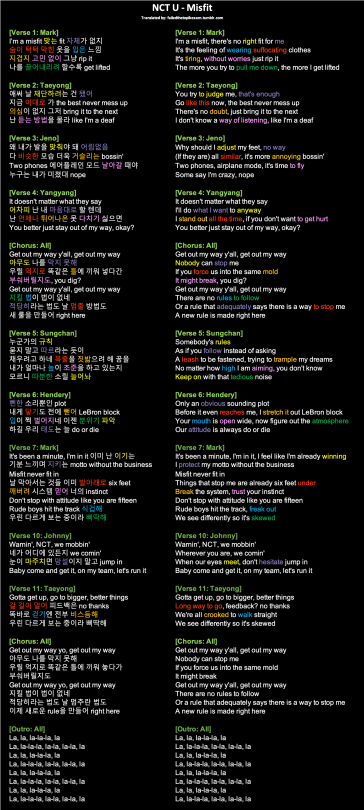
Main vocabulary (in order of appearance)
- 맞다 = to be correct, to be right
- 자체 = self, oneself
- 숨이 턱턱 막히다 = to be suffocating, stifling
- 숨 = breath
- 턱턱 = easily, completely
- 막히다 = to be blocked, stopped
- 입다 = to wear
- 느낌 = feeling, sense
- 지겹다 = boring, tedious
- 고민 없다 = without worry
- 고민 = worry, anguish
- 끌어내리다 = to drag down, to take down, to demote
- 애써 = with effort, laboriously, with force
- 재단하다 = to judge, to cut out
- 됐다 = that’s enough
- 이대로 = like this, as it is
- 의심 = doubt
- 그저 = just
- 방법 = way, means, manner
- 맞추다 = to be in harmony, adapt, adjust
- 어림없다 = impossible, absurd, preposterous
- 비슷하다 = similar, to be like
- 모습 = appearance, look, form
- 더욱 = more, further
- 거슬리다 = to be irritated, be offended
- 날아가다 = to fly, to fly away, to be gone
- 때 = time, moment
- 마치다 = to be crazy
- 어차피 = in any case, anyway
- 마음대로 = as one likes, as you want
- 언제나 = all the time, always
- 튀어나오다 = to protrude, stick out, pop out
- 다치다 = to be hurt, injured
- 아무도 = nobody
- 막지 못하다 = to not stop, to not block
- 막하 = to block, close, enclose, stop
- 억지로 = reluctantly, forcibly
- 똑같다 = exactly the same, identical
- 틀 = mold, frame, framework
- 끼워 넣다가다 = to put in
- 끼다 = to stick in, to fasten
- 넣다가다 = to put in
- 부쉬버리다 = to break completely
- 부수다 = to break, smash, destroy
- 버리다 = to throw away, discard
- 지키다 = to guard, defend, protect OR to obey, observe
- 법 = law, act, rule
- 적당히 = adequately
- 멈추다 = to stop, halt
- 규칙 = rule
- 묻다 = to ask, inquire
- 따르다 = to follow
- 듯 = like
- 채우다 = to fill
- 목줄 = leash
- 짓밟다 = to trample, stamp on
- 높다 = high
- 조준 = aiming
- 따분하다 = boring, dreary
- 늘어놓다 (늘어놔) = to harp on, to speak at length
- 뻔하다 = evident, clear
- 닿다 = to reach, arrive
- 뻗다 = to stretch, extend, straighten
- 입 = mouth
- 쩍 = with a smack, crack, split
- 벌어지다 = to widen, to part, to broaden
- 분위기 = atmosphere, mood
- 파악 = understanding, figure out, realise
- 태도 = attitude
- 늘 = always, often
- 이기다 = to win, beat
- 기분 = mood, feelings
- 발아래 = below one’s feet
- 깨버리다 = to break completely
- 깨다 = to break, shatter
- 믿다 = to believe
- 식겁하다 = to freakify
- 삐딱하다 = to be slanted, askew
- 마주치다 = to happen to meet, eyes meet
- 망설이다 = to hesitate
- 갈 길 = long road ahead
- 멀다 = to be distant, far off
- 똑바로 = straight, truthfully
- 걷다 = to walk
- 전부 = all, everything
- 비스듬하다 = askew
Key Grammar
VERB -(으)ㄹ수록 = The more ______ the more ______
ADJ/VERB/NOUN -어/아야 되다 = have to ___ , must ____
ADJ/VERB/NOUN -(으)ㄹ 텐데 = Expresses the expected future state of something
ADJ/VERB/NOUN -(으)ㄹ지도 모르다 = It might…; You don’t know if…
VERB -지 말고 _____ = don’t do ____, do ______
NOUN -뿐 = Nothing more than ____ ; Only / Just
“Day that’s become deeper, my shadow that’s become longer. Far over there, the sun’s becoming darker, maybe I’m struggling through the darkness that’s becoming thicker. Am I trapped in this place?”
“What lights me up are the stars embroidered with your love. In my universe, you create another world for me.”
—My Universe | BTS x Coldplay
“Even when many days pass, I will stay next to you. Even if I throw myself away, I want to stay next to you. Please you stay alive.”
— Stay Alive | Jungkook (prod. SUGA)
“Like the first snow on a midsummer night, you’re an unbelievable miracle, surprising moment. The wind that blows again someday, I will wait for you even if your heart wanders.”
—Christmas Tree | V (Our Beloved Summer OST Pt. 5)




•Aesthetic wallpaper
•Kpop Lyrics
•don’t repost
•Songs: happiness, hann, nevermind and euphoria
•Artist: red velvet, (g)i-dle and Bts
Click the picture for more quality
blackpink lyric lockscreens ♡
reblog or like this if you use any of this, don’t steal them, please ♡ show some love ♡ you can request if you want
Post link
the bright colours look so cute!! ✨
cr: @twinklerenjun_ on Twitter
✺
✺
disclaimer - I don’t own most of my lockscreens; they come from Pinterest! if one of them happens to be yours, just message me and i will give you credit :)
Post link
K-POP Vocabulary: Taeyeon (태연) - Spark (불티)
불어후후
빨간불티야
내 마음도 너 같아
타오를 듯 위험한
살포시널눌러
덮으려 해 봐도
꺼지지 않는 너를
어떻게 해야 하나?
- 불다 to blow
- 불티 spark
- 타오르다 to blaze
- 살포시 gently, softly
- 누르다 to control, to suppress
- 덮다 to cover
여릴 줄만 알았던
그 작은 온기속
뭐를감추고있었니
내 안에 내가 많아
온 밤이소란한데
혹시 내 말을 들었니
- 여리다 to be soft, to be tender
- 온기 warm air
- 감추다 to hide
- 온 밤 all night
- 소란하다 to be noisy
이제타이밍이야
눈 뜰새벽이야
불티를깨워
- 타이밍 timing
- 눈(을) 뜨다 to open one’s eyes
- 깨우다 to awake
더 타올라라 후 후후후
꺼지지 않게
붉디붉은채
더 크게 번져 후 후후
지금 가장 뜨거운
내 안의 작고 작은
불티야 불티야 꺼지지 말고 피어나
불티야 불티야 새벽을 훨훨 날아가
새 불티야 불티야 춤추듯 온몸을 살라
새 불티야 불티야 꺼지지 말고 피어나
- 붉디붉다 to be deep red
- 번지다 to spread, to grow
- 피어나다 to bloom, to burn
- 훨훨 날아가다 to flutter away
- 사르다 to burn out
이 까만 어둠을
동그라니밝혀
내 앞을 비추는너
어디든 갈 수 있어
세찬 바람을 타고
떠올라내려 보면
우린 이 별의 여행자
- 동그랗다 to be round
- 밝히다 to light up
- 비추다 to light on
- 어디든 any place
- 세차다 to be strong
- 내려보다 to look down
어제 길 위의 넌 꿈만 꾸고 있었지
작은 새처럼 작은 새처럼
이제 타이밍이야, 너의 시간이야
숨을 불어넣어 불티를 깨워
- 숨을 불어넣다 to blow into




